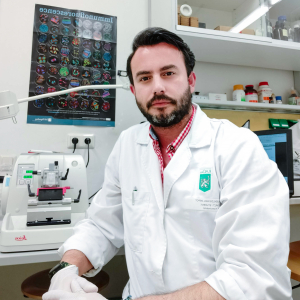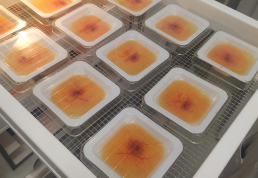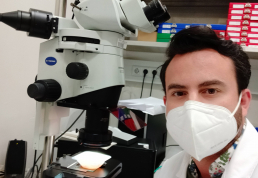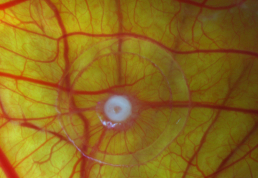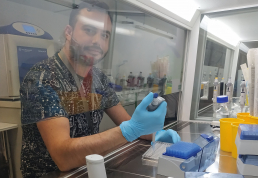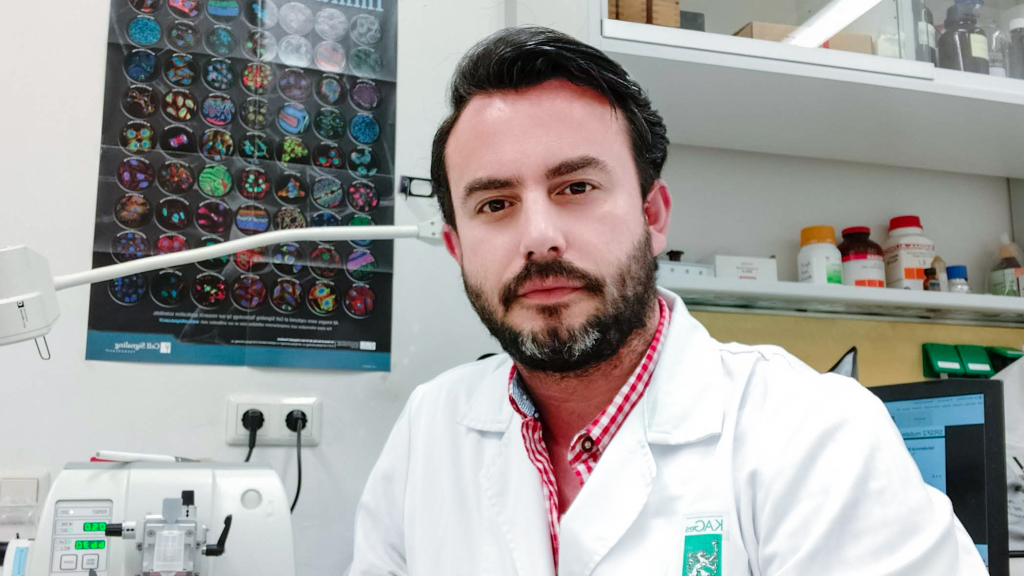
Our colleague, Miguel Ángel Merlos Rodrigo, MSc., Ph.D. successfully published the article Metallothionein-3 promotes cisplatin chemoresistance remodeling in neuroblastoma in March this year, in which he examines the impact this protein regulation in tumor cells and the mechanisms underlying cisplatin resistance (you can find the full article here https://www.nature.com/articles/s41598-021-84185-x ). This year, Miguel also took part in an internship abroad in Graz, Austria, which follows in the published article and metallothionein-3 protein is again one of the main reasons for researching, because we are working intensively on it at the Department of Chemistry and Biochemistry.
How does our foreign colleague evaluate his studies and work at Mendel University, how does he like it in the Czech Republic and what has he achieved in his research? Not only this will you find out in the following interview.
Miguel, could you briefly introduce for the reader what your published article is about and what you have achieved in the research?
My published article deals with a breakthrough in connection with a neuroblastoma tumor, which is the most common cancer in infants and also one of the most common tumors in children under 5 years of age. The leading causes of death in patients with this neuroblastoma include metastases and tumor resistance to conventional therapy. Cisplatin is a platinum coordination compound that is generally considered to be one of the most effective drugs for various cancers. Despite the high efficacy of cisplatin, cancer cells often develop cisplatin chemoresistance, or resistance to drugs.
Metallothionein is involved in many cellular processes, and human metallothionein-3 is predominantly secreted by the central nervous system, including the bladder, prostate, esophagus, or stomach. However, prior to our studies, the clear significance of metallothionein-3 expression outside the central nervous system and its involvement in carcinogenesis was unknown.
Thus, for the first time in the article, we reported that cisplatin-sensitive tumor cells were remodeled into cisplatin-resistant cells by high expression of metallothionein-3 in an in vivo model using a chicken test. Thus, we provide the first evidence that an increase in metallothionein-3 protein increased chemoresistance, i.e., the resistance of cisplatin treatment in tumor cells, and high levels of metallothionein may therefore be one of the causes of frequent tumor relapse.
Why did you decide to research this particular issue?
I have been working on this topic for almost nine years. The main reason is that, despite thousands of studies that have successfully described its structure and properties, this protein remains a major mystery in its effects on tumor cells. In addition, many studies have recently shown that the expression of metallothionein varies from tumor to tumor, suggesting that metallothionein may play a crucial role in the conversion of cells to tumor cells. Among other things, this is the main topic in my laboratory.
How long did the research and preparation for this article take?
The research and preparation for this article began in 2019, where I was awarded with The Federation of European Biochemical Societies (FEBS) Short Term Fellowship: In Vivo Model to Study the Effect of Cisplatin on Neuroblastoma Invasion and Metastasis by Chick Chorioallantoic Membrane (CAM) Assay. That same year, I presented my proteomics results at International Congress on Targeted Anticancer Therapy TAT-2019 in Paris (France), where I was awarded the Merit Award 2019 from European Society for Medical Oncology – ESMO. However, I have carried out several studies on metallothioneins and neuroblastoma since 2016, publishing more articles about chemoresistance in human neuroblastoma. Thanks to these results, I was awarded the International Brain Organization IBRO-2017 Grant to travel to San Francisco (California, USA) where I discussed my results with the scientific community during the Advances in Neuroblastoma Research 2017 congress.
How was the cooperation with other colleagues in the Czech Republic and abroad?
I am happy to say that I have an amazing cooperation with my colleagues from the department, both Czech and foreign. Many years ago, I also collaborated on several projects with researchers in the fields of cell and molecular signaling, pediatrics, oncology and pathophysiology. I can mention names like Dr. Berta Casar and Piero Crespo from Spain IBBTEC or prof. Tomáš Eckschlager from the Motol Hospital and Charles University in Prague. I am very grateful for all the cooperation.
Do you plan to address this issue further in the future?
Yes, metallothionein changes affect a person’s biological fitness on multiple levels, which will definitely need to be better understood. Metallothioneins may one day serve as potential clinical tools for new therapies. In addition, I also focus on studying this family of proteins in diseases other than cancer, such as obesity and diabetes.
Why did you choose Mendel University (and Czech Republic in general) for your studies and career?
I studied biology at the University of Jaén in Spain and then obtained a master’s degree (with distinction) in agricultural biology at the University of Granada, Spain. Then I changed my residence to the Czech Republic, specifically to Brno, where I started my doctoral studies in chemistry at our Department. The main reason was that Mendel University in Brno has a high-quality background designed for research and teaching, enabling researchers and students to develop their skills and knowledge. In addition, according to the highly respected Quacquarelli Symonds (QS) ranking, Brno is one of the ten best student cities in the world, which is unbelievable! The location in the Czech Republic is another advantage, because it is located right in the middle of Europe. This makes it ideal for traveling almost anywhere in Europe. It is also one of the lowest unemployment rates in the EU, mainly due to foreign companies coming to the country. The options here are great.
How do you like working and studying in the Czech Republic? Could you briefly compare the options that are offered in our country and in Spain?
I like working at our Department and I am satisfied with my scientific career in the Czech Republic. We have a lot of researchers with very good qualifications, great equipment and we often publish in journals, which is very important. Brno seems like a city of students and young foreigners, and in my opinion, it is much more accessible than the capitals or states of Western Europe. Even so, there are not so many differences between Spain and the Czech Republic in scientific matters. Spain also has prestigious scientists and pioneering research institutes. However, there is less funding for research in recent years, which complicates the development of research and scientific careers.
How would you describe social life in the Czech Republic, do you like it here?
I really like social life in the Czech Republic. I love beer and adventure, so I think I’m in the best place. Brno has many bars and pubs – in the summer season, everyone is mainly outside, which is amazing and fascinating. There are so many natural and other monuments that are worth seeing!
Do you plan to stay in the Czech Republic?
Yes, thanks to working at the Department as a researcher, I can continue to develop my career here. In addition, I apply for various project calls to obtain my own funding within our department.
How do you manage communication, are you learning the Czech language or is English enough for you?
English is the common language of the scientific and general world. In Czech Republic, many people speak English. Also, I am studying Czech, but it is very difficult.
You are currently on an internship. Could you tell us where you are specifically and for what purpose you traveled?
I work at the Institute of Immunology and Pathophysiology of the Medical University of Graz, Austria. This university is the center of innovative state-of-the-art medicine, and the institute focuses on human diseases and primary analyzes based on in vivo cell models. The purpose of my internship is to carry out a project to study the effect of cisplatin on the angiogenesis, invasion and metastasis of prostate cancer by a test in a living model. With this in vivo model, I will be able to elucidate the role of metallothionein as a predictive marker of prognosis, later in order to prepare new therapeutic approaches in prostate treatment.
For how long is your internship?
Three months (From March to May 2021).
Was it difficult to arrange an internship due to the current situation?
Unfortunately, I had to postpone my trip last year due to the COVID19 pandemic.
Working in the laboratory is not easy since we cannot be many people in the same laboratory. However, the members of my lab in Graz are organized very well and the experiments are going well. The social events are still prohibited. It is not the best moment for social life. Every week, the department organizes an online lab meeting where we discuss our results and issues.
Does your internship have any limitations due to the current situation? Can you actually work?
I don’t have any limitations as long as I use FPP2 masks and social distance (2 meters). Austria has till curfew at 20:00. In addition, all workers of the Medical University in Graz (it’s not my case) have been vaccinated against COVID19 since February/March 2021.
